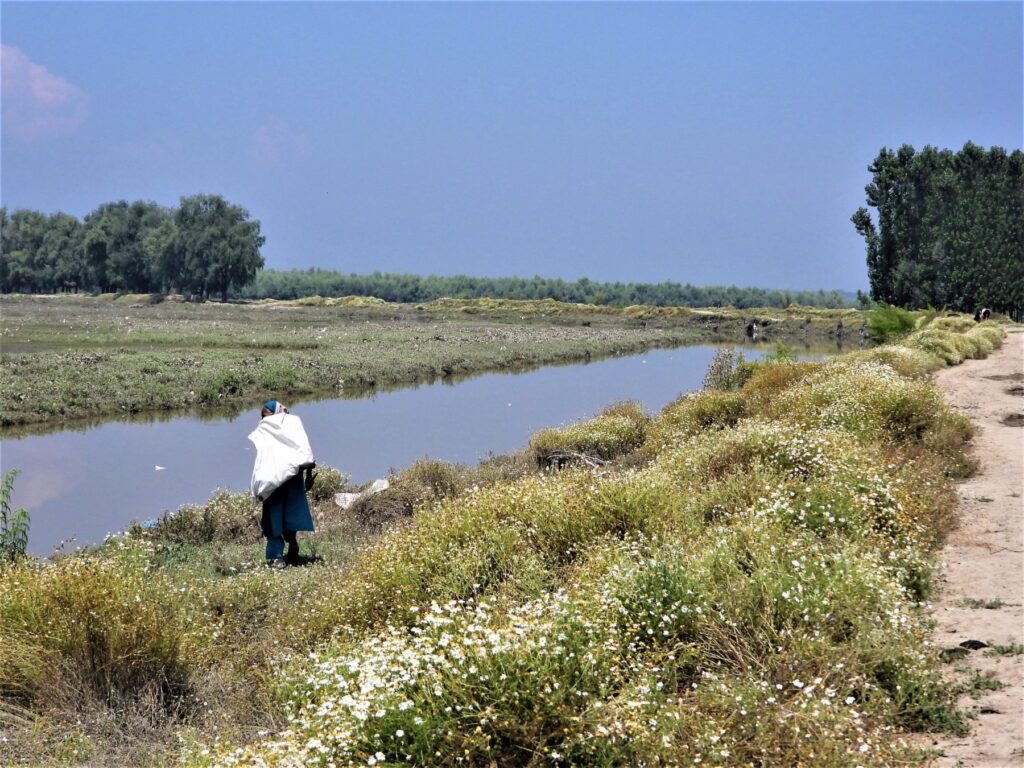Earth Has Lost 1/5th Of Its Wetlands Since 1700
Feb 15, 2023 | Pratirodh Bureau
Dredging of a flood spill channel in Kashmir's Hokersar Wetland has turned a major portion into a 'landmass'. People need to stop looking at wetlands as wastelands, there for us to drain and turn into “useful” land (Image: Athar Parvaiz)
Like so many of the planet’s natural habitats, wetlands have been systematically destroyed over the past 300 years. Bogs, fens, marshes and swamps have disappeared from maps and memory, having been drained, dug up and built on.
Being close to a reliable source of water and generally flat, wetlands were always prime targets for building towns and farms. Draining their waterlogged soils has produced some of the most fertile farmland available.
But wetlands also offer some of the best natural solutions to modern crises. They can clean water by removing and filtering pollutants, displace floodwater, shelter wildlife, improve our mental and physical wellbeing and capture climate-changing amounts of carbon.
Peatlands, a particular type of wetland, store at least twice the carbon of all the world’s forests.
How much of the Earth’s precious wetlands have been lost since 1700 was recently addressed by a major new study published in Nature. Previously, it was feared that as much as 50% of our wetlands might have been wiped out. However, the latest research suggests that the figure is actually closer to 21% – an area the size of India.
Some countries have seen much higher losses, with Ireland losing more than 90% of its wetlands. The main reason for these global losses has been the drainage of wetlands for growing crops.
Wetlands Are Not Wastelands
This is the most thorough investigation of its kind. The researchers used historical records and the latest maps to monitor land use on a global scale.
Despite this, the new paper highlights some of the scientific and cultural barriers to studying and managing wetlands. For instance, even identifying what is and isn’t a wetland is harder than for other habitats.
The defining characteristic of a wetland – being wet – is not always easily identified in each region and season. How much is the right amount of wetness? Some classification systems list coral reefs as wetlands, while others argue this is too wet.
And for centuries, wetlands were seen as unproductive wastelands ripe for converting to cropland. This makes records of where these ecosystems used to be sketchy at best.
The report shows clearly that the removal of wetlands is not spread evenly around the globe. Some regions have lost more than average. Around half of the wetlands in Europe have gone, with the UK losing 75% of its original area.
The US, central Asia, India, China, Japan and south-east Asia are also reported to have lost 50% of their original wetlands. It is these regional differences which promoted the idea that half of all the world’s wetlands had disappeared.
This disparity is somewhat hopeful, as it suggests there are still plenty of wetlands which haven’t been destroyed – particularly the vast northern peatlands of Siberia and Canada.
An Ecological Tonic
Losing a wetland a few acres in size may not sound much on a global or even national scale, but it’s very serious for the nearby town that now floods when it rains and is catastrophic for the specialised animals and plants, like curlews and swallowtail butterflies, living there.
Fortunately, countries and international organisations are beginning to understand how important wetlands are locally and globally, with some adopting “no-net-loss” policies that oblige developers to restore any habitats they destroy. The UK has promised to ban the sale of peat-based composts for amateur growers by 2024.
Wetland habitats are being conserved around the world, often at huge expense. Over US$10 billion (£8.2 billion) has been spent on a 35-year plan to restore the Florida Everglades, a unique network of subtropical wetlands, making it the largest and most expensive ecological restoration project in the world.
The creation of new wetlands is also underway in many places. The reintroduction of beavers to enclosures across Britain is expected to increase the nation’s wetland coverage, bringing with it all the advantages of these habitats.
Beaver dams and the wetlands they create reduce the effects of flooding by up to 60% and can boost the area’s wildlife. One study showed the number of local mammal species shot up by 86% thanks to these furry engineers.
Even the sustainable drainage system ponds developers create on the fringes of new housing estates could see pocket wetlands appearing in towns and cities across the UK. By mimicking natural drainage regimes instead of removing surface water with pipes and sewers, sustainable drainage systems can create areas of plants and water that have been shown to increase biodiversity, especially invertebrates.
Whether the total global loss of wetlands is 20% or 50% doesn’t really matter. What does matter is that people stop looking at wetlands as wastelands, there for us to drain and turn into “useful” land.
As the UN recently pointed out, an estimated 40% of Earth’s species live and breed in wetlands and a billion people depend on them for their livelihoods. Conserving and restoring these vital habitats is key to achieving a sustainable future.
(This article is republished from The Conversation under a Creative Commons license. Read the original article)
